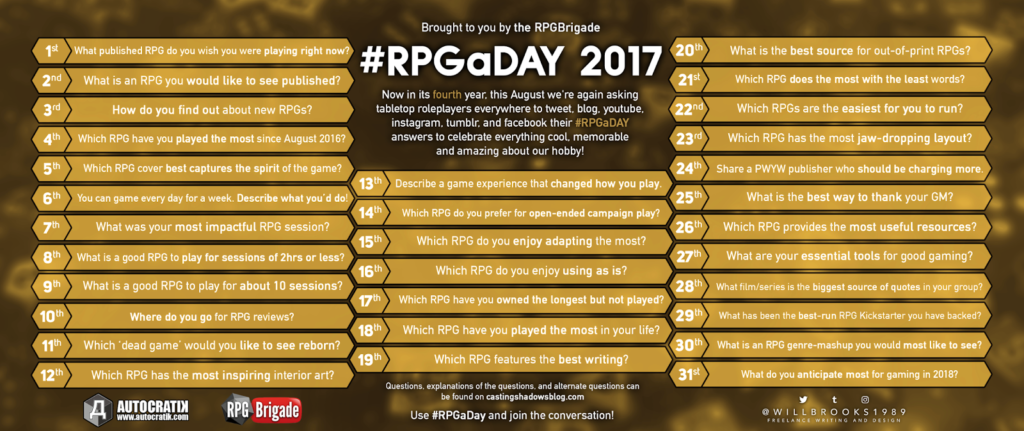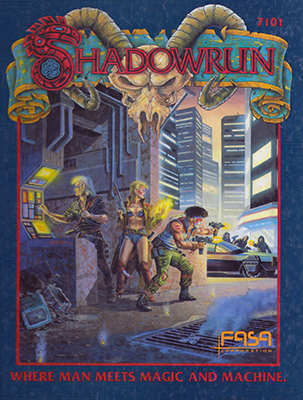For each of the past few years, David F. Chapman has published a list of 31 role-playing game related questions in August, coordinated under the moniker “RPG a Day”. This year is no exception. I have not participated in this before because, while I like the idea, I dislike the way my social media feed explodes with answers to each day’s question, tending to drown out other stuff. So, rather than make a separate post for each question, I’m just going to answer them all on a single page, and only post the link to social media at the beginning and the end. This year’s questions are:
1st) What published RPG do you wish you were playing right now?
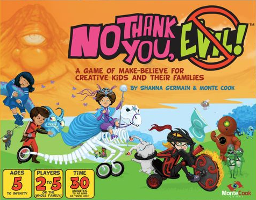 There are a ton of games on this list, but I
really want to be playing something with my six year old son right now,
something like No Thank
You, Evil! by Monte
Cook Games, built on a kid-friendly iteration of the Cypher System. I backed both of the
Kickstarter’s for this game, so have a full complement of gear for it.
The game scales to age by simplifying the “I’m a {adjective} {noun} who
{verbs}” pattern for a character’s concept based on age (e.g. the
youngest kids have characters defined just by “I’m a {noun}”. I’ll be
interested to see how much complexity my son can handle. I’m guessing
this could lead into playing the Cypher System game Predation,
which he would really dig.
There are a ton of games on this list, but I
really want to be playing something with my six year old son right now,
something like No Thank
You, Evil! by Monte
Cook Games, built on a kid-friendly iteration of the Cypher System. I backed both of the
Kickstarter’s for this game, so have a full complement of gear for it.
The game scales to age by simplifying the “I’m a {adjective} {noun} who
{verbs}” pattern for a character’s concept based on age (e.g. the
youngest kids have characters defined just by “I’m a {noun}”. I’ll be
interested to see how much complexity my son can handle. I’m guessing
this could lead into playing the Cypher System game Predation,
which he would really dig.
2nd) What is an RPG you would like to see published?
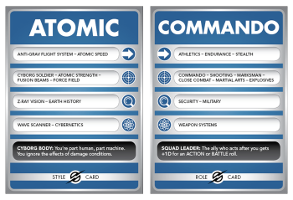 The teased and hinted at Danger Patrol
Gamma. While the current “Pocket Edition” of Danger Patrol by John Harper’s one.seven design studio has
been the last word in the game, this edition gave up some of
the things I liked about the beta version. The author has hinted at
a “gamma” version, which looked like it was going to be card based.
Using cards (or the half-pages of the beta version), you guarantee that
no two people are making use of the same option in their character,
which can’t be said of the pocket edition. Yet, the pocket edition has
some clear improvements over the beta version, so I’m looking forward to
something that does both.
The teased and hinted at Danger Patrol
Gamma. While the current “Pocket Edition” of Danger Patrol by John Harper’s one.seven design studio has
been the last word in the game, this edition gave up some of
the things I liked about the beta version. The author has hinted at
a “gamma” version, which looked like it was going to be card based.
Using cards (or the half-pages of the beta version), you guarantee that
no two people are making use of the same option in their character,
which can’t be said of the pocket edition. Yet, the pocket edition has
some clear improvements over the beta version, so I’m looking forward to
something that does both.
3rd) How do you find out about new RPGs?
 Mostly by reading my G+ feed. If you’ve been thinking G+
is a ghost town, you’re wrong, particularly when it comes to RPGs.
Mostly by reading my G+ feed. If you’ve been thinking G+
is a ghost town, you’re wrong, particularly when it comes to RPGs.
Some other sources are worth mentioning, though. One of the best things to happen to RPGs in the last year or two has been the culture of play fostered by the Gauntlet and its associated podcasts, particularly its main community podcast. It’s common for a given episode to call my attention to a game I’d never heard of, or known only marginally.
I also kickstart a lot of games. Unfortunately, Kickstarter’s search is still terrible and its support for RSS is non-existent. Recently, Leo Zovic built a bunch of Atom feeds for Kickstarter. These can be customized, so I built one that provides a custom RSS feed for RPG projects on Kickstarter. One drawback is that it also shows computer games marked as “rpgs”, but that’s as good as Kickstarter’s search can manage.
4th) Which RPG have you played the most since August 2016?
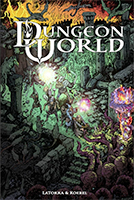 This is, sadly, an easy question to answer,
because I haven’t played much in the past year. What I have played has
been mostly Dungeon
World, by Sage LaTorra
and Adam Koebel.
This is, sadly, an easy question to answer,
because I haven’t played much in the past year. What I have played has
been mostly Dungeon
World, by Sage LaTorra
and Adam Koebel.
Specifically, we’ve been playing in Monte Cook’s Ptolus setting, using a few custom rules to tune the system to the setting, which is a bit more cosmopolitan and magic item heavy than straight Dungeon World.
5th) Which RPG cover best captures the spirit of the game?
6th) You can game every day for a week. Describe what you’d do!
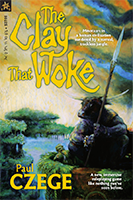 I’m assuming this means
all day, every day, so I’d go somewhere with great scenery and
minimal hustle and bustle, like Zion National Park or a
yacht anchored off Kleftiko
or something. The games would depend on the players, but I’ll guess a
bit. This would probably be a trip without the kids. We’d divide each
day into three four hour sessions, with meals in between.
I’m assuming this means
all day, every day, so I’d go somewhere with great scenery and
minimal hustle and bustle, like Zion National Park or a
yacht anchored off Kleftiko
or something. The games would depend on the players, but I’ll guess a
bit. This would probably be a trip without the kids. We’d divide each
day into three four hour sessions, with meals in between.
Each morning session would be a different game, run as a one-shot. In these games, we’d try to enforce the tone, whatever that might be. We’d probably run, in no particular order:
- Lady Blackbird
- Don’t Rest Your Head
- Blowback
- 44: A Game of Automatic Fear
- Night Witches
- A Dirty World
- Technoir
Each afternoon session would be one installment of a seven session mini-campaign of something. It would probably one of these:
- Fourth World, my drift of Dungeon World to the setting of Earthdawn
- Blades in the Dark
- The Clay That Woke
Evening sessions would be games that play well while drinking, and would likely not be serious at all. Most would be one-shots, but maybe a few could go a couple sessions.
- Fiasco using my Vegas, Baby! playset
- Shadowrun Anarchy
- Index Card RPG
- It’s Not My Fault!
- Low Life
- Wandering Monsters High School
- The World Wide Wrestling Roleplaying Game
7th) What was your most impactful RPG session?
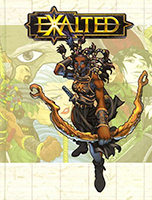 It wasn’t a bad
session. In fact, I barely remember most of it, which was a lot of the
problem. I do remember that we didn’t get as far along as I’d hoped, and
thinking about why, a blunt question popped into my head: “why are you
investing so much time and
effort into a game with such shit mechanics? Again?” I still don’t
have a justifiable answer to this question, but after that session I
gave up on deep diving into irredeemable rulesets just because I loved
the setting to which they were attached.
It wasn’t a bad
session. In fact, I barely remember most of it, which was a lot of the
problem. I do remember that we didn’t get as far along as I’d hoped, and
thinking about why, a blunt question popped into my head: “why are you
investing so much time and
effort into a game with such shit mechanics? Again?” I still don’t
have a justifiable answer to this question, but after that session I
gave up on deep diving into irredeemable rulesets just because I loved
the setting to which they were attached.
I’d done this before. For years prior, I’d spent a ton of free time building crap for another game with mechanics almost as bad, maintaining a big gear list, even managing the FAQ. It, too, had a world that I loved then and still love now. I gave up on that game, but for kinda the wrong reason. That was more of a feeling that I just wasn’t getting enough back from the game as I was putting into it. (It didn’t help that I burned a bridge with the game’s creators entirely by accident.)
Don’t get me wrong, I still love the worlds of Exalted and Shadowrun, and I will play again in those worlds in a heartbeat, but only using totally different rules. After that session, I’m never going to devote myself to shit systems ever again.
8th) What is a good RPG to play for sessions of 2hrs or less?
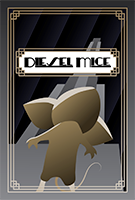 Pretty much any game for
kids better fit into sessions two hours or less. From what I’ve heard of
people running games with really little kids, their attention spans
don’t stick with the game for more than a half-hour or so. Turns out you
are spoiled for choice in the “games targeted at kids” arena, these
days, with games like:
Pretty much any game for
kids better fit into sessions two hours or less. From what I’ve heard of
people running games with really little kids, their attention spans
don’t stick with the game for more than a half-hour or so. Turns out you
are spoiled for choice in the “games targeted at kids” arena, these
days, with games like:
- No Thank You, Evil!
- Epyllion
- Little Wizards
- Golden Sky Stories
- Mermaid Adventures
- First Fable games like Diesel Mice
- Hero Kids
- Adventure Maximus
- rpgKids
- Project Ninja Panda Taco
9th) What is a good RPG to play for about 10 sessions?
 I tend not to play campaigns in this duration
much, usually either shorter or much longer. Any game that can handle
more than ten sessions can certainly handle just ten, but there are some
games which contain a bit more meat than you can reach in a one shot
where you might not want to devote a year of play to it. That seems like
it depends more on your curiosity level than it does on the game.
I tend not to play campaigns in this duration
much, usually either shorter or much longer. Any game that can handle
more than ten sessions can certainly handle just ten, but there are some
games which contain a bit more meat than you can reach in a one shot
where you might not want to devote a year of play to it. That seems like
it depends more on your curiosity level than it does on the game.
I’d be interested in playing ten sessions of Legacy: Life Among the Ruins, to give its multi-generational and family mechanics a good stretch. Maybe I will do that when the second edition (currently being kickstarted) is ready.
10th) Where do you go for RPG reviews?
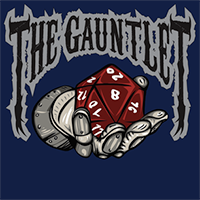 I almost never seek out RPG reviews. I almost
never read “customer reviews” of RPG products at places like One Book Shelf. I no longer
frequent role-playing forums.
I almost never seek out RPG reviews. I almost
never read “customer reviews” of RPG products at places like One Book Shelf. I no longer
frequent role-playing forums.
The only place I even encounter reviews of games are the stray mentions on social media and the play reports on the Gauntlet podcast. I’ve also enjoyed when Rob Donoghue deep dives into one system or another over multiple blog long blog posts (here’s the first one for 13th Age, for example).
11th) Which ‘dead game’ would you like to see reborn?
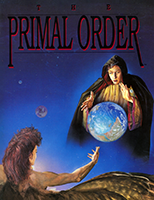 The Primal
Order isn’t really dead. No game really is, particularly with
all the resurrections being done on Kickstarter lately. TPO
was more dead than most for years, until 2013, when Peter Adkison
republished the PDF of the game. Given the lack of support since,
though, it seems likely that this republishing was more of a way to
retain certain legal rights to the property than any firm desire to
resurrect the game.
The Primal
Order isn’t really dead. No game really is, particularly with
all the resurrections being done on Kickstarter lately. TPO
was more dead than most for years, until 2013, when Peter Adkison
republished the PDF of the game. Given the lack of support since,
though, it seems likely that this republishing was more of a way to
retain certain legal rights to the property than any firm desire to
resurrect the game.
Also, TPO wasn’t exactly a game, but rather a “capsystem” that allowed you to add gods to any game in a way that made them more than just “NPCs with really good stats”. It also opened an interesting way for playing gods as PCs, in its own early-1990’s fashion. It’s not quite right, but there is a lot of meat there that more modern game design could extract.
The game has been a bit of a legal mess, largely because it implemented its notion of being a “capsystem” (a rules set that sits on top of other rules systems) backwards. At the end of TPO were a set of appendices, each one of which detailed how to use TPO with an existing system (e.g. AD&D, Ars Magica, Shadowrun, etc.). Game rules can’t be copyrighted and the book properly sighted copyrights and trademarks, so legally wansn’t infringing. People brought lawsuits against it anyway. That was part of what killed the game. The other was that its small-time publisher soon had its hands full turning another game it produced a year later, Magic: The Gathering, into a globe-spanning juggernaut.
At any rate, now days, making a “capsystem” would more likely succeed the other way around: being issued as an open license. Publishers (or fans) could then build the conversions themselves, if they needed to. (In the present environment, I’m not sure anyone would really find converting something into whatever system they used that unusual or burdensome enough to need a special document for it anyway.)
I have toyed with the idea of buying the IP for TPO for the sole purpose of releasing it under a Creative Commons Attribution-NonCommercial-ShareAlike 4.0 International license. In fact, I’ve wondered allowed about setting up something like a charity that exists to secure permission to do this with other dormant games. This is probably a pipe dream though, as most publishers appear to be content sitting on games that earn nothing and would cost too much to put back into print, assuming some alchemy will suddenly make them worthwhile again (I guess) rather than find out what cool stuff an unfettered world with do with it.
12th) Which RPG has the most inspiring interior art?
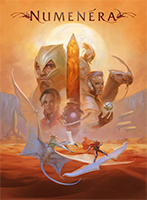 Numenera
wins awards for interior art for a reason. The whole product line just
looks phenomenal and makes me want to explore the place. It also has the
advantage of being slightly strange without being grimdark body-horror stuff.
Numenera
wins awards for interior art for a reason. The whole product line just
looks phenomenal and makes me want to explore the place. It also has the
advantage of being slightly strange without being grimdark body-horror stuff.
13th) Describe a game experience that changed how you play.
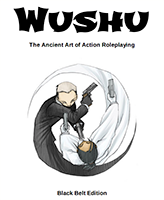 After playing a lot from grade school through
a number of years after college, I entered a long stretch where I was
moving around and couldn’t really get into a gaming groove. Eventually,
I got back on the horse but, in the interim, things like the Forge
happened and I missed most of it. So, when I happened across a copy of
Wushu, a wuxia action game, I
was, appropriately, punched in the face by its introduction:
After playing a lot from grade school through
a number of years after college, I entered a long stretch where I was
moving around and couldn’t really get into a gaming groove. Eventually,
I got back on the horse but, in the interim, things like the Forge
happened and I missed most of it. So, when I happened across a copy of
Wushu, a wuxia action game, I
was, appropriately, punched in the face by its introduction:
Action movies have always been at odds with realism. Fortunately for us, their conflict is easily resolved with a series of savage kicks to realism’s face! Impossible leaps, insane acrobatics, and victory against overwhelming odds are all staples of the genre… and the essential elements of action role-playing games.
Sadly, traditional RPGs have long been in league with realism. They penalize players who want to, say, kick seven mooks with one spin kick by piling negative modifiers onto their roll, which makes them less likely to succeed. The inevitable result is that smart players stick to simple, boring actions and take a tactical approach to combat. Wushu breaks up this insidious alliance with a core mechanic that rewards players for vivid descriptions and over-the-top stunts by making them more likely to succeed, each and every time.
For anyone who’d been paying attention to what was happening in gaming up to then, this sentiment would be totally unsurprising and obvious but, for me, it was a satori moment, combining both a sense that I’d been doing it wrong for decades with a clear illumination about how to proceed. (Then, I wandered from the path immediately by starting to play Exalted.)
14th) Which RPG do you prefer for open-ended campaign play?
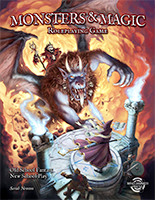
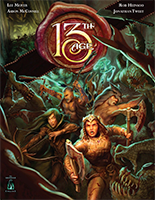 I’m answering this one with
what game I would pick if I wanted to start a new open-ended campaign.
Such campaigns tend to feature long player power curves, where
characters “improve” over a long time scale, and more traditional games
tend to focus on this more. Apart from some of the other games I’ve
mentioned in previous questions, it’d be a toss up between two different
takes on fantasy.
I’m answering this one with
what game I would pick if I wanted to start a new open-ended campaign.
Such campaigns tend to feature long player power curves, where
characters “improve” over a long time scale, and more traditional games
tend to focus on this more. Apart from some of the other games I’ve
mentioned in previous questions, it’d be a toss up between two different
takes on fantasy.
One choice would be 13th Age. When Wizards of the Coast went off to ruminate on building the fifth edition of Dungeons & Dragons, the lead designers of third and fourth editions teamed up to create an alternative, released about a year before “D&D Next” was. The result impresses me as more than just an extension/evolution of 3E and 4E, but a more cohesive game entirely. Running an open ended campaign in this system, I would definitely throw their unique take on the megadungeon, Eyes of the Stone Thief, into the mix.
Another choice would be Monsters & Magic by Sarah Newton. Unlike some OSR stuff which merely apes early D&D editions (all of which also still exist), M&M is framed to allow use of all those old school adventures you have (particularly the old Judges Guild stuff) right out of the box, but still embraces the idea that game design has usefully advanced in 40 years. (If, for some reason, you want to know if this makes it a “legitimately OSR game”, there are no shortage of self-appointed OSR gatekeepers eager for followers they can shepherd to the answer; my interest in that question is zero.)
There are so many other games, I’m not sure I’ll ever get either of these to the table, but each sounds fun for its own reasons.
15th) Which RPG do you enjoy adapting the most?
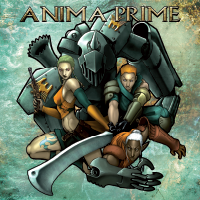 I’ve had a ton of fun
hacking on Anima
Prime, a game by Christian Griffen that bills
itself as a “fast-paced, spontaneous roleplaying game inspired by the
Final Fantasy series of video games as well as
Avatar: The Last Airbender and other animated shows and
movies”. (Note: because of the name, this game is sometimes confused
with the heartbreaker Anima:
Beyond Fantasy. There is no relation.)
I’ve had a ton of fun
hacking on Anima
Prime, a game by Christian Griffen that bills
itself as a “fast-paced, spontaneous roleplaying game inspired by the
Final Fantasy series of video games as well as
Avatar: The Last Airbender and other animated shows and
movies”. (Note: because of the name, this game is sometimes confused
with the heartbreaker Anima:
Beyond Fantasy. There is no relation.)
My immediate thought when first reading Anima Prime was “oooo…I could hack this to play Exalted” and I’ve spent quite a bit of effort doing just that. I posted my first tinkerings on the unofficial Exalted wiki in 2011. Since then I’ve gone a bit overboard with it. I built a big document just for my group called Exaltation Prime, which turned into a full layout project, using inspiring “borrowed” art and lots of changes and iterations (on version 1.5 at the moment). I wound up with something of manageable size that would allow you to play any type of the exalted (each of which required 250 page “splatbooks” in their original system) plus a number of character types that you can’t really play in the original game. (Want to play as a manse? No problem.) Exalted is a “kitchen sink” game, and my hack can also manage most of its more involved systems (e.g. sorcery, shapeshifting, shaping, crafting, astrology, warstriders, etc.).
One of the things I love about Anima Prime is that it is a little bit crunchy, but not massively so. This hits a sweet spot for me. Another thing I like is that with just some simple ideas, there is quite a bit to hang hacks onto. In the time that I’ve been hacking on it, its author has done some hacking of his own, usually aimed at making the game more simple or GM-less or the like. My hacks tend to go the other way, making it a slightly more complicated.
Unfortunately, I can’t really release what I’ve done in its current form, mostly due to the borrowed art, but also because Exalted is a closed system. Fortunately, Anima Prime itself is released under a Creative Commons license. I’ve been toying with the idea of sanitizing the hacks I’ve made to it of references to Exalted and releasing more of a “hacking guide” to the game, called Prime Spiral. I should really get cracking on that.
16th) Which RPG do you enjoy using as is?
Every game. At least the first time I play it. There is a tendency to want to drift games as you read them, thinking “that probably won’t work unless I tweak it like this”. Resist! The designer probably thought about whatever it is longer, harder and deeper than you have. You owe it to both yourself and the designer to try the game as written at least once. It may turn out that you were right, but sometimes you discover surprises during play.
17th) Which RPG have you owned the longest but not played?
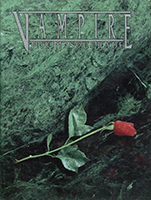 The phrasing of this
question results in, to me, a surprising answer: the original Vampire:
The Masquerade. While I certainly bought some games before
this that I never played, I do not still own them, and haven’t for a
while. V:tM is still on my bookshelf, though.
The phrasing of this
question results in, to me, a surprising answer: the original Vampire:
The Masquerade. While I certainly bought some games before
this that I never played, I do not still own them, and haven’t for a
while. V:tM is still on my bookshelf, though.
I almost played once, even going so far as to conceive a character, but that game never actually hit the table. After that, whatever motivation I might have had to play was stymied by lack of interested compatriots. I didn’t really look very hard, I suppose.
This game features an example of something that happens to me when I read games from time to time. Occasionally, while reading, I’ll get fixated on a sentence in the text and that leads somewhere for play. I remember reading a sentence in the V:tM that mentioned vampires of a particular clan tend to get “stuck” in the fashions of the time they first became vampires and thinking “man, what if you got turned when fashion sucked?” This, naturally, led to the character I conceived: a young Ventrue stuck in the pastels and stubble of Miami Vice-era fashion.
I still want to play that guy.
18th) Which RPG have you played the most in your life?
 This
question was asked on G+ a while back and figuring out my answer
surprised me. By hours played:
This
question was asked on G+ a while back and figuring out my answer
surprised me. By hours played:
- Shadowrun (second edition)
- Exalted (first edition)
- Star Frontiers
- Top Secret
- D&D (second edition)
AD&D misses the list, but only barely. If you combine D&D editions/Pathfinder, it might push into third position, maybe second.
19th) Which RPG features the best writing?
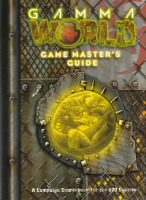 Everyone is going to
answer this question with Paul
Czege’s The Clay That
Woke, which is the right answer, but I already mentioned that
game above, so I’m going to take a different angle.
Everyone is going to
answer this question with Paul
Czege’s The Clay That
Woke, which is the right answer, but I already mentioned that
game above, so I’m going to take a different angle.
A whole bunch of roleplaying games have a “what is a roleplaying” section. Many also have a “what is being a game master all about” section. The vast majority of these are terrible. One, however, was not. The sixth edition Gamma World Game Master’s Guide opens with a chapter called “Some Assembly Required” that might be the best “what is being a game master all about” advice of all time. The book is otherwise fairly unremarkable, but that opening is gold.
That chapter was written by Greg Stolze in 2004, about three years before he wrote Reign (a game that, among other things, lacks both a “what is roleplaying” and a “how to GM” section). Since then, he has made two short PDFs with introductory advice available for free on his download page, called “How to Play Roleplaying Games” and “How to Run Roleplaying Games”. At this point, no game needs to ever add sections addressing these two topics, because these two PDFs already exist.
20th) What is the best source for out-of-print RPGs?
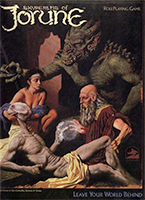 I don’t really want to answer
this one, because it means competition for when I want to find something
out of print. But, the answer is pretty obvious to anyone who has gone
looking for out-of-print RPGs: Wayne’s Books.
I don’t really want to answer
this one, because it means competition for when I want to find something
out of print. But, the answer is pretty obvious to anyone who has gone
looking for out-of-print RPGs: Wayne’s Books.
The store’s interface leaves a little to be desired, but functions well enough. Most of the listings are also posted on Amazon as well, so searching there may lead you to his listings as well.
When a history of roleplaying games was published (the four-volume Designers & Dragons), it really put a dent in my wallet as I was reminded of games I’d had and lost, games I’d always wanted but had forgotten, and games I never knew existed. I found a great deal of what I was after at Wayne’s Books and the experience was flawless each time, particularly in the accuracy of how the book’s condition was described.
21st) Which RPG does the most with the least words?
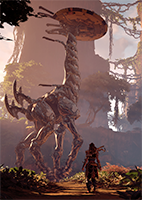 I’ve seen a lot of RPG
contests come and go but, honestly, very few entries of any of them
really grab me. But I wanted to play Mechanical
Oryx instantly. As the winner of this year’s 200 Word RPG Challenge, author
Grant Howitt managed to turn
just 200 words into something profound. The game might be thought of as
playing as the robots in the world of Horizon
Zero Dawn, if the robots’ were intended to be benevolent
caretakers of the humans.
I’ve seen a lot of RPG
contests come and go but, honestly, very few entries of any of them
really grab me. But I wanted to play Mechanical
Oryx instantly. As the winner of this year’s 200 Word RPG Challenge, author
Grant Howitt managed to turn
just 200 words into something profound. The game might be thought of as
playing as the robots in the world of Horizon
Zero Dawn, if the robots’ were intended to be benevolent
caretakers of the humans.
Seriously, just go read the thing and marvel at the emergent complexity of how the goals of the players will mix with the mechanics they have available to reach them. All in a couple of sentences.
After the winner of the contest was announced, one of the judges interviewed the author, which is worth a listen not only for talking about this particular game, but also about The Spire, which just completed a successful Kickstarter.
22nd) Which RPGs are the easiest for you to run?
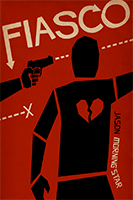 The ones that don’t require a
game master. Duh.
The ones that don’t require a
game master. Duh.
Of these, Fiasco is probably easiest to run, because you can bust it out on people who don’t know anything about roleplaying games, and they can “get it” quickly enough. Wil Wheaton, Alison Haislip, Bonnie Burton, and John Rogers demonstrate playing on episode eight of Tabletop.
Some other GM-less games may work better for what you are after though, like:
- Primetime Adventures
- Cheat Your Own Adventure
- Archipelago
- Fall of Magic
- Microscope
- Shock: Social Science Fiction
- The Quiet Year
- Capes
- Ocean
23rd) Which RPG has the most jaw-dropping layout?
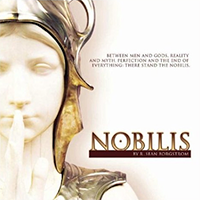 The use of “jaw-dropping”
confuses this question. I mean, the layout for HōL:
Human Occupied Landfill probably qualifies as
“jaw-dropping”, but only because you couldn’t believe anyone would
release a book looking that shitty. Similarly, the distractingly bad
indenting in the otherwise intriguing Continuum
makes me slack-jawed.
The use of “jaw-dropping”
confuses this question. I mean, the layout for HōL:
Human Occupied Landfill probably qualifies as
“jaw-dropping”, but only because you couldn’t believe anyone would
release a book looking that shitty. Similarly, the distractingly bad
indenting in the otherwise intriguing Continuum
makes me slack-jawed.
Neither of those are a good thing.
But if the question is meant to mean jaw-dropping in a good way, you probably don’t need to look further than the second edition of Nobilis. Known as the “Great White Book”, this work was designed like a coffee table museum book, and elevated the humble game manual to a hight that has rarely been matched.
One game that came close recently was the archival quality production of two-volume Guide to Glorantha. What makes your jaw drop about these books, though, is less the layout (which is quite good), but more the weight, using high quality glossy paper similar to a really highbrow classical art book. It wasn’t that I really needed to buy these books, it’s just that I couldn’t escape their gravitational pull.
24th) Share a PWYW publisher who should be charging more.
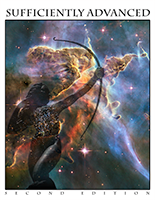 (Unlike of lot of
people who responded negatively to this question, I’m interpreting it as
“tell us about a cool PWYW publisher”.) A lot of publishers have
released occasional pay-what-you-want products, but I’m limiting my
consideration for this question to publishers who make predominant or
sole use of PWYW publishing. (I’m also discounting publishers who make
things funded in some other way that then get released as PWYW, such as
Evil Hat’s amazingly good
Patreon which creates “world books” for their patrons, but also
releases them as PWYW.)
(Unlike of lot of
people who responded negatively to this question, I’m interpreting it as
“tell us about a cool PWYW publisher”.) A lot of publishers have
released occasional pay-what-you-want products, but I’m limiting my
consideration for this question to publishers who make predominant or
sole use of PWYW publishing. (I’m also discounting publishers who make
things funded in some other way that then get released as PWYW, such as
Evil Hat’s amazingly good
Patreon which creates “world books” for their patrons, but also
releases them as PWYW.)
For my answer, I’m going with Valent Games, which is “mostly Colin Fredericks, with occasional help from other folks”. Everything in his DriveThruRPG catalog is either free or PWYW and is usually Creative Commons to boot. He is unafraid to experiment, and all of it reaches further than your typical “100 Thingys From Random Tables” PWYW content, particularly Sufficiently Advanced, a diceless, far-future, transhumanism game.
(Fredericks also had the gall to release a game named Valence over a decade before I released my crappy, unfinished Game Chef entry of the same name, but I forgive him.)
I also have a couple of honorable mentions for this question:
- Neoplastic Press, the “publishing imprint of Rafael Chandler”, also has a catalog that is either free or PWYW. His production and writing are high quality. (They also heavily embrace body horror, which isn’t really my jam.)
- Levi Kornelsen also mostly uses the PWYW model for his games, all of which have a distinct visual style and “toolkit” approach.
- Only some the games from Red Box Vancouver, written by Johnstone Metzger, are PWYW, but they all rock. Nearly all of them are also released simultaneously for two systems: Labyrinth Lord and Dungeon World.
25th) What is the best way to thank your GM?
Running a game yourself so they can be a player.
Or, y’know, a Prophecy gaming table.
Either way.
26th) Which RPG provides the most useful resources?
Usually, is not the RPG that provides the resources, its the RPG’s fans. Back in the day, fans of Shadowrun always brought it. This is even true with games that have been dead for years (maybe especially true with them). Take a look at what’s out there for Star Frontiers, for example.
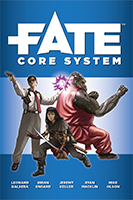 But, if you have to pick
resources provided by the publishers themselves, I’ve been really
impressed with what Evil Hat is
doing with Fate
Core.
But, if you have to pick
resources provided by the publishers themselves, I’ve been really
impressed with what Evil Hat is
doing with Fate
Core.
First, they have no qualms offering and supporting a slimmed-down version of the game that seems even more fun to me: Fate Accelerated. Not many publishers have the guts to do this simultaneously, and back up both as “first tier” products in their line. It helps that they can write products usable by both games without too much effort.
Second, they also have released what amount to hacking manuals for the game. These books function at a slightly different level than, say, GURPS books do. The latter tend to be collections of new rules and options you can splice into a setting, while the Fate toolkit line is aimed more at teaching you how to invent rules and alter the game to match a setting. In the same ballpark, but not really the same thing.
Third, I mentioned Evil Hat’s Patreon up above, which creates some really compelling setting hacks for the game. But this Patreon came after they published a series of “world books”, like Worlds on Fire and Worlds in Shadow, each of which contains six different settings.
It’s also worth calling out what they don’t do. A lot of larger gaming companies try to build mini-ecosystems out of a single product idea. These are sometimes really great, like the adventures, miniatures, maps, and wide variety of stuff surrounding the Pathfinder adventure path Rise of the Runelords. But its like the difference between a depth-first versus breadth-first searching. Where much game support dives deep into a single concept, Fate support casts a wider (but more shallow) net, knowing half the fun is filling in the blanks as you play.
Lastly, they’re not afraid to drink their own Kool-Aid and hack and drift their core rule set into distinct games merged to a distinct setting, like Dresden Files Accelerated and the Atomic Robo RPG. Even you you don’t play in those settings, you can still learn a lot about how they changed the game to fit them.
I’m also giving Honorable Mention here to Eclipse Phase. The first big game to really embrace the crap out of the potential of the Creative Commons license, the game goes a step beyond in offering their hack packs which include art assets you are encouraged to use (also under the CC license).
27th) What are your essential tools for good gaming?
Good players.
And Post-Its® in various colors.
28th) What film or series is the most-frequent source of quotes in your group?
 My current group doesn’t do a lot
of movie quoting, surprisingly. One reason may be that they are steeped
in anime lore while I am not at all. We all, however, have kids, so we
get a surprising amount of milage out of The Lego
Movie.
My current group doesn’t do a lot
of movie quoting, surprisingly. One reason may be that they are steeped
in anime lore while I am not at all. We all, however, have kids, so we
get a surprising amount of milage out of The Lego
Movie.
The last group I really remember quoting stuff tended to be at the time and place where we pulled lots of quote from The Tick animated series. “‘You are here.’ Uh-huh…uh-huh…being here is a lot like being lost, Arthur.” Every line the Evil Midnight Bomber What Bombs at Midnight said probably showed up in that campaign at one time or another.
(Odd aside, I wrote most of the responses to these questions well ahead of time. I hadn’t heard any Tick quotes for some time, but about an hour after originally writing this, Dyson Logos posted a Tick reference. Really weird, Jungian crap, man.)
29th) What has been the best-run RPG Kickstarter you have backed?
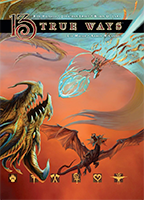 I back a lot of
kickstarters, most of them RPG kickstarters. And I don’t really know
how to answer this question. Most would assume that a well-run
kickstarter is on that communicates well, delivers what it promises and
does so exactly on time. And, to be sure, there a number of RPG
kickstarters that have done all three (pretty much anything by Monte
Cook Games, Goodman
Games, or Bully
Pulpit Games, for example). But, I’m not so sure that “well-run”
means “best-run”.
I back a lot of
kickstarters, most of them RPG kickstarters. And I don’t really know
how to answer this question. Most would assume that a well-run
kickstarter is on that communicates well, delivers what it promises and
does so exactly on time. And, to be sure, there a number of RPG
kickstarters that have done all three (pretty much anything by Monte
Cook Games, Goodman
Games, or Bully
Pulpit Games, for example). But, I’m not so sure that “well-run”
means “best-run”.
I have even more respect for projects where things go to hell but, eventually, the creator makes good anyway. You don’t have to look far for people who gave up when things went bad. The best example I’ve seen of someone sticking with it and ultimately doing right by his backers as been Jack Dire’s Superfight! campaign, but that was a card game, not an RPG.
But, I have a hard time singling out one RPG kickstarter as “best-run”. So, I’m going to go with two creators for atypical reasons.
First, the packaging used by the 13 True Ways project went above and beyond every other kickstarter I’ve backed. No corners squished during shipping for those books.
Second, the projects from Reaper Miniatures have always been extremely complicated, yet easy to follow, and I always got my correct order. It a logistical feat unrivaled in the kickstarters I’ve backed. (Even if they do sometimes fixate on insipid “tits & ass” promo figures.)
30th) What is an RPG genre-mashup you would most like to see?
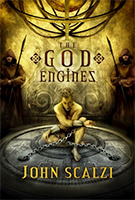 “Hard(ish) science-fiction”
mashed up with “gods among us”. I want to know how Thor and Loki are
sneaking around the year 2555 AD. I want to play as demigods wandering
worlds where some mortals don’t believe gods actually exist but control
technologies that can give them immortality, heightened physical and
mental abilities. I want to be involved in inter- and intra-pantheon
politics in a galaxy where new religions rise and fall with the speed of
social networking and various mortal factions vie for control over
sections of not only known space, but over the hearts and minds of
sentient beings. I want to play artificial minds that have faith in what
they cannot explain and explore what that looks like. I want to play in
a world where demons
have to be whipped to provide faster-than-light travel.
“Hard(ish) science-fiction”
mashed up with “gods among us”. I want to know how Thor and Loki are
sneaking around the year 2555 AD. I want to play as demigods wandering
worlds where some mortals don’t believe gods actually exist but control
technologies that can give them immortality, heightened physical and
mental abilities. I want to be involved in inter- and intra-pantheon
politics in a galaxy where new religions rise and fall with the speed of
social networking and various mortal factions vie for control over
sections of not only known space, but over the hearts and minds of
sentient beings. I want to play artificial minds that have faith in what
they cannot explain and explore what that looks like. I want to play in
a world where demons
have to be whipped to provide faster-than-light travel.
But I do not want that world to have anything to do with Lovecraftian bullshit.
And, yeah, maybe I already wrote about an eighth of such a game, but I’m looking for something else.
31st) What do you anticipate most for gaming in 2018?
 I tend to be surprised when new
games come out, so I’m not in a great position to answer this one. What
I do know comes mostly from Kickstarters that promise delivery in 2018.
I’ve mentioned some of these already, above. Things I’m looking forward
to include:
I tend to be surprised when new
games come out, so I’m not in a great position to answer this one. What
I do know comes mostly from Kickstarters that promise delivery in 2018.
I’ve mentioned some of these already, above. Things I’m looking forward
to include:
- Based on my answer to the prior question, it should come as no surprise I’m anxious to see FAITH: The Sci-Fi RPG
- Legacy: Life Among the Ruins, second edition.
- The Spire.
- Dungeon Crawl Classics Lankhmar.
- Gauntlets & Goblins.
